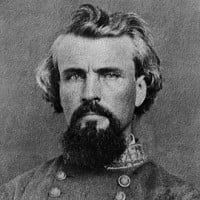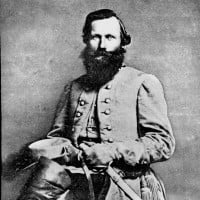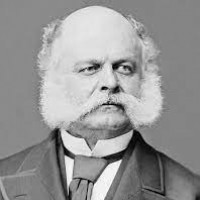Top 10 American Civil War Generals
 Robert Edward Lee was an American and Confederate soldier, best known as a commander of the Confederate States Army. He commanded the Army of Northern Virginia in the American Civil War from 1862 until his surrender in 1865.
Robert Edward Lee was an American and Confederate soldier, best known as a commander of the Confederate States Army. He commanded the Army of Northern Virginia in the American Civil War from 1862 until his surrender in 1865. I remember when he surrendered to Grant. Don't get me wrong, Grant is a fantastic General, but he is nothing compared to Lee. When forced to surrender, Lee, being the gentleman he is, is dressed in his finest uniform, and brings a golden sword as a peace offering. general Grant shows up, with mud all over his uniform, and lights a cigar. It's not just his good manners that makes Lee superior to Grant. To think about it, the Union had way more supplies, ammunition, weapons, and soldiers than the Confederacy, and the Confederacy came THIS CLOSE to winning. They couldn't have done it without a fantastic leader.
 Ulysses S. Grant was an American soldier and statesman who served as Commanding General of the Army and the 18th President of the United States, the highest positions in the military and the government of the United States.
Ulysses S. Grant was an American soldier and statesman who served as Commanding General of the Army and the 18th President of the United States, the highest positions in the military and the government of the United States. Grant had to operate offensively, deep in Confederate territory, with hostile residents. He operated far from supply lines and occasionally separate from communication lines. Lee fought at home the entire war with the exception of Gettysburg. Grant was not the tactician the Lee was, but was a better strategist. Grant had to conquer a "nation" of traitors, while Lee had to hope the US would tire of a long war. Grant realized after Vicksburg that a long war with complete defeat of the South was the only resolution to secession.
Had he lived longer he may have "prolonged" the war, but he would not enable the confederacy to win the war. Think about it from a strategic, resource perspective. My opinion may not be popular, but it is more realistic. Every general had bad days/battles, Lee included.
I was named after Lee, but Jackson was the better commander. Having only ever lost one fight, he did extraordinary things with very few resources. One of the greatest military minds in history, in my opinion.
Superb tactician; soldiers General. A Godly man.
The first real modern general. He understood the basics of total warfare before anyone else
Hard charging relentless supporter of Grant's vision for victory.
A tank was named after him. Has any one heard of a stonewall tank?

When Lee was asked, who his finest soldier was, he commented "A general I've never met Nathan Bedford Forrest", Sherman echoed the same, The greatest military mind on either side of the war. 3rd grade education and not a west pint graduate!
#1 not that surrendering coward Robert E Lee for sure or that Sherman stay 200 Miles south of Forrest cause of Fear of him and Transmississippi Huge Army. Nat Bedford Forrest is all time 7-1 in battles as a general of men.
It doesn't matter what you think about what he did outside being a general, there is no denying Nathan Bedford Forrest was a genius.
He was smart, cared for his men he commanded. His troops respected him. Great strategist. Even though he may not have liked some of the Generals above him he still showed them respect and believed in the cause. Cleburne deserves much more respect and attention.
Widely considered to be the best defensive general of the war, Sherman and Grant were also of that opinion.
He never lost a battle in which he had command and he never lost his portion of a battle no matter who was in command.
He was also a force to be reckoned with when he was on the offensive.
Only twice in all the war was a major Confederate army driven away from a prepared position in complete rout, at Chattanooga and at Nashville, both times with the blow coming from men under his command.
Also, the only general of the civil war to completely annihilate an opposing army (in the battle of Nashville).
If he cared about self-promotion (which he didn't, he even turned down a promotion to the rank of lieutenant general), he could have been as well-known as Sherman or Jackson.
Longstreet was a superb tactician, especially on the defensive. Working in a Republican administration after the war had a negative impact on his image in the South; this in turn may have had a negative impact on his rating as a Confederate general.
Lee called him "My Old Warhorse". Lee also stated on numerous occasions that Old Pete was his best lieutenant. Old Pete was a great battlefield strategist. Unfortunately, the blatantly incompetent Ewell worked hard to tarnish Longstreet's name after the war.
Hancock was indispensable to the Union victory at Gettysburg. One day, he established the outline of the entire Union position, from Culp's Hill to Little Round Top, and advised Meade that the site was defensible with good troops. On day two, his quick decisions maintained the Union position on a number of occasions, most notably when he used the 1st Minnesota Regiment to buy enough time to plug a gaping hole in the Union line. On day three, his Second Corps bore the brunt of, and successfully repulsed, Pickett's Charge. And it should be remembered that a decisive Confederate victory at Gettysburg would have, in all probability, won the war for the South, notwithstanding Grant's success at Vicksburg.

Likewise saw that South should have followed a defensive/Fabian strategy that gave ground to fight on times & places where it was to their advantage.

He seemed to be a pretty good strategist, his biggest flaw was sticking with a plan even if circumstances made it not as good, (Meade removing the U.S.C.T. at the Crater, and the late pontoon bridges at Fredericksburg. He also managed to launch successful campaigns in North Carolina as well as East Tennessee. He doesn't get much credit however, because he was an honest man, and never tried to make his reputation something it wasn't, as was the case with many other Generals.
Only major defeat was Fredericksburg, maybe not the best, but he wasn't as bad as many people see him. Most Generals had a major defeat at some point, for instance, Lee at Gettysburg, and Grant at Cold Harbor. Not A great general, but not horrible either. He did fine as a core commander, and didn't want command of the Entire army. He declined twice, and only accepted when he was told it was either him or Hooker, (who also failed).
This guy fought the Battle of Gettysburg against Lee and won.
A genius on defense, a bad temper hurt his reputation.
I'm surprised that Johnston wasn't already on here. He though he was not the greatest (That distinction belongs to Lee) he did a good job in command of the Western Theatre considering what he had. After his death at Shiloh the Western Theatre went awry and it was all downhill from there
He treated no one with disrespect. When he received the confederate surrender (Grant chose him because he knew he would treat them with respect) he saluted them and General John B. Gordon called him the knightliest officer of the union army
He isn't a 4 star general. He was a brigadier general, one star general. The youngest general of that time. Got promoted when he was 20 or 24 (something like that).
Should be rated MUCH HIGHER. Grant & Sherman both rated him above Lee. He had a Grand Strategy of defensive/Fabian warfare strategy that might have worked for the South; Lee never did. He stood up to Jeff Davis; Lee acquiesced.
Killed early in war but was considered excellent general.
Probally the best defensive general in the war,kept Sherman at bay for many months.